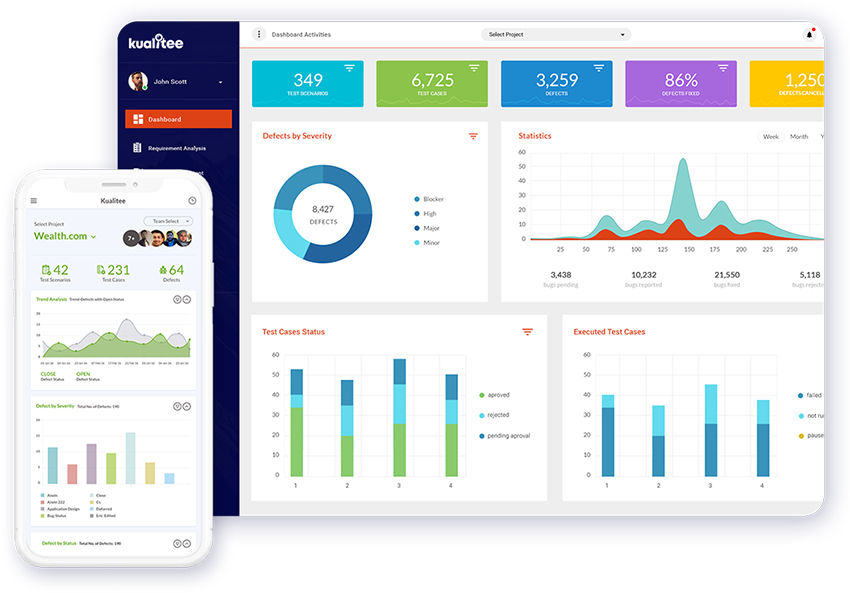Test management tools have become essential for organizations looking to streamline their testing processes and ensure the quality of their software. Test management tools enable teams to effectively manage their test cases, track bugs, and execute tests. These tools are designed to help teams create more efficient testing cycles, reduce time spent on manual processes, and improve communication between stakeholders.
When choosing a test management tool, it’s important to consider the features that best suit your needs. Popular test management tools include Practitest, TestRail, qTest Manager, TestLink, TestLodge, Kualitee, Zephyr for Jira, and Test Collab. Each of these tools offers a range of features that can help you manage your testing process more effectively.
Practitest is a platform designed for end-to-end test case management that allows teams to plan tests, track progress, and report on results in one place. It enables users to easily set up tests with automated notifications and reporting capabilities.
TestRail is a comprehensive solution for managing all aspects of the testing process including bug tracking and reporting. It includes features such as automated test execution and real-time dashboards to help teams collate data quickly and accurately.
qTest Manager is another comprehensive test management solution with integrated defect-tracking capabilities. It simplifies the process of creating tests by allowing users to quickly create structured tasks within each project stage.
TestLink is an open-source online test management system that helps teams organize their tests into suites or categories based on their requirements or objectives. In addition to supporting manual testing activities, it also provides support for automated tests using various scripting languages such as Perl or Python.
TestLodge is an intuitive web-based solution for managing all aspects of software testing from planning through execution. It provides an easy way to write effective test cases with step-by-step instructions and powerful bug-tracking capabilities.
Kualitee is a cloud-based platform designed specifically for agile teams who need easy access to issue tracking while they work in sprints or iterations throughout the development cycle. It offers powerful defect-tracking capabilities as well as integration with popular project management tools such as JIRA and Trello allowing testers to track their progress in real-time without having to switch applications constantly during testing cycles.
Zephyr for Jira is a powerful plugin that integrates seamlessly with the existing Jira interface enabling testers to create custom workflows for each phase of the project lifecycle including defect tracking and execution reports in real-time without leaving the main application interface.
Finally, Test Collab offers an array of features including bug-tracking functionality as well as custom reports which can be generated from any device at any time making it ideal for those who need access from different locations throughout the day or night when necessary due to tight deadlines or other pressures related to product delivery timescales.
All these tools provide excellent solutions when it comes to managing your software testing process efficiently but there are some differences between them depending on what type of workflow you require. The choice ultimately rests upon you as an organization but no matter which option you choose, investing in an appropriate test management tool will pay dividends in terms of overall quality assurance, efficiency savings, streamlined processes, improved collaboration among stakeholders, reduced risk factors, timely product releases, better customer satisfaction levels, enhanced customer retention rates along with other associated benefits.

Test Management Tools
Test management tools are software tools that help facilitate and monitor the process of software testing. These tools provide a centralized platform to manage all aspects of software testing, including test planning, test case creation, test execution, defect tracking, and reporting. They also provide features such as risk-based testing, traceability matrixes, requirements management, and automated test execution. This helps ensure that all the necessary steps for a successful testing process are in place and that everyone is on the same page throughout the process. Popular test management tools on the market include Practitest, TestRail, qTest Manager, TestLink, TestLodge, Kualitee, Zephyr for Jira, and Test Collab.
Is Jira an Effective Test Management Tool?
Yes, Jira is a test management tool that helps teams coordinate their testing efforts. It provides a suite of features designed to help quality assurance teams, software testers, DevOps team members, and decision-makers track and manage the testing process. Jira allows users to create test case definitions and assign tasks to testers, track progress on tests throughout the cycle, and store results for reporting purposes. It also enables teams to capture bug reports and prioritize bug fixes. Additionally, Jira can be used to organize product releases by tracking user stories and tasks associated with each release. All of these features make it a powerful tool for improving the efficiency and effectiveness of the testing process.
The Benefits of Using a Test Management Tool in Selenium
A test management tool in Selenium is a platform that allows QA testers to create and execute custom tests, and track their test execution reports. It integrates with Selenium, Jira, Bitbucket, and Jenkins to provide an automated testing system. The platform enables testers to define their test cases, plan their test cycles, execute tests in multiple environments, compare the results of different test runs, and generate detailed reports for analysis. It also supports various scripting languages such as Java, Python, and C# for easy execution of tests. Test management tools in Selenium help streamline the entire testing process by providing a centralized platform that ensures quality assurance across all applications.
The Use of Team Foundation Server (TFS) as a Test Management Tool
Yes, Microsoft TFS (Team Foundation Server) is a comprehensive test management tool. It provides features that enable teams to plan, execute, and track their testing activities, including manual and automated tests. With TFS, testers can create test plans and suites to organize their tests. They can also record the results of their tests and share them with other team members. Furthermore, TFS integrates with Visual Studio to help ensure effective communication throughout the software development process.
The Benefits of Using Excel as a Test Management Tool
Excel is a powerful tool for test management, documentation, and reporting. It can be used to plan, document, and report tests in an organized and efficient way. With its vast array of features, Excel provides users with the flexibility to customize their test management process according to their needs. It also helps teams save time by automating mundane tasks such as data entry and analysis. Furthermore, it is often used in conjunction with other tools such as bug-tracking software or performance testing tools to create comprehensive test management workflows. In short, Excel is a powerful and versatile tool that can be used for Test Management.
Is DevOps a Test Management Tool?
No, DevOps is not a test management tool. Rather, it is a set of practices and technologies that enable organizations to increase their agility and speed when delivering software products. DevOps enables teams to work collaboratively on different areas such as automated building, automated testing, and automated provisioning of infrastructure for deployment. This helps to reduce the time needed to release high-quality software products. A test management tool is then used in combination with DevOps practices and technologies to automate the testing process and ensure quality before releasing software products.
Is SQL a Testing Tool?
No, SQL is not a testing tool. It is a programming language used to communicate with databases and manipulate data. Testing tools are software applications used to test the functionality of your application and identify any potential errors or bugs. Some popular testing tools include HP UFT, Selenium, and Cucumber.
Is Cucumber a Test Management Tool?
No, Cucumber is not a test management tool. It is an open-source software testing tool written in Ruby that enables testers to write automated tests in plain language. These tests are written as Feature Files that describe the behavior of the system under test and then can be executed by running them through the Cucumber test runner. Cucumber is not designed to manage tests or create reports, but rather to provide a way for teams to easily write and execute automated tests.
Is JMeter a Test Management Tool?
No, JMeter is not a test management tool. JMeter is a performance and load testing tool that helps to analyze and measure the performance of web applications. It performs tests such as Stress Testing, Load Testing, Distributed Testing, Functional Testing, Regression Testing, and more. It can be used to check the functionality, performance, and scalability of web applications. JMeter also provides the ability to monitor server resources such as CPU, memory, disk usage, and network traffic during the test runs. Therefore, it is not a test management tool but rather a tool that can help with the management of testing.
The Benefits of Agile Test Management
Agile test management is an approach to software testing that leverages agile development practices and principles. It emphasizes close collaboration between testers, developers, and other stakeholders throughout the entire software development process. Agile test management takes a holistic view of testing, focusing on end-user needs rather than specific technical requirements. This approach encourages teams to shift their focus away from traditional siloed roles, instead emphasizing cross-functional collaboration and continuous improvement. Additionally, it seeks to continuously improve the process of testing itself by gathering feedback and using it to inform progress. By taking an agile approach to test management, organizations can ensure that they are delivering high-quality products in a timely manner while minimizing costs and risks.

Comparing TFS and Jira: Which Is Better?
It is difficult to definitively answer which tool is better between TFS and Jira, as both have their own strengths and weaknesses. TFS, or Team Foundation Server, from Microsoft, is a comprehensive ALM product for managing development projects of all sizes. It offers features such as Agile planning tools, source control management, bug tracking, automated builds and deployments, test case management, reporting, and dashboards. Additionally, it integrates with a range of other Microsoft products like Visual Studio Team Services and Office 365.
Jira is an issue-tracking platform developed by Atlassian that allows teams to plan, track progress, and release software. It provides users with an easy way to create and assign tasks across teams and keeps track of project progress in real-time with agile boards and reports & dashboards. Jira also offers extensive customization options allowing users to tailor the system to their exact needs. Additionally, Jira integrates with a wide range of external tools including Bitbucket, Confluence, HipChat, and many more.
when deciding which tool is better for your team it’s best to evaluate the strengths of each option against your project requirements in order to make a well-informed decision.
Comparing Jira and TFS: Which is Better?
Overall, Jira is generally considered a better ALM (Application Lifecycle Management) tool than TFS (Team Foundation Server). Jira has a wide range of features and integrations that make it well-suited to many different types of projects, including issue tracking and project management. It also has an open-source framework and is often used by many organizations as the go-to software for managing tasks and issues. Additionally, Jira’s user-friendly interface and a vast selection of plugins make it more customizable for users.
In comparison, TFS is limited in terms of features and integrations. However, it does offer better collaboration features and is typically used by larger organizations as its capabilities are more powerful than those offered by Jira.
Regardless of which tool you choose, both can provide good value for project management teams. Ultimately, your decision should be based on your team’s needs and budget.
Conclusion
In conclusion, test management tools are essential tools for teams to ensure the quality of their products and software. They offer a wide range of features that enable users to design, document, and execute tests, track test execution reports, explore new features and bugs, and collaborate with other members of the DevOps team. Popular tools on the market include Practitest, TestRail, qTest Manager, TestLink, TestLodge, Kualitee, Zephyr for Jira, Test Collab, Microsoft TFS, and Team Foundation Server. By leveraging these tools in their product development efforts, teams can ensure that their products are of the highest possible quality before they reach customers.







